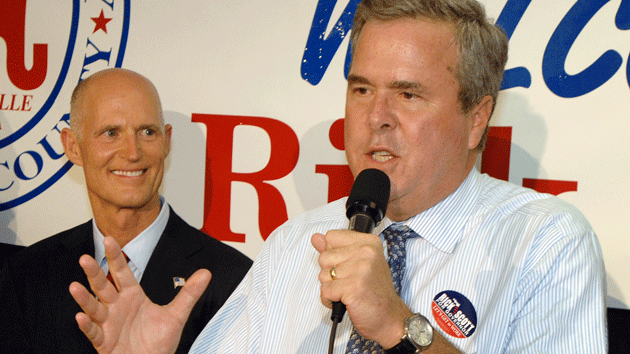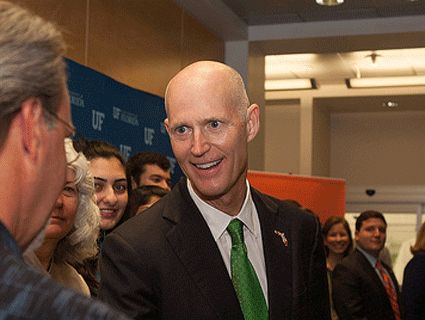
Former Florida Gov. Jeb Bush campaigning for Rick Scott in 2010Bob Self/Florida Times-Union/AP
Rick Scott was a tea party darling when he squeaked out a victory in 2010 to become governor of Florida with the help of an army of grassroots conservative activists. Four years later, Scott, facing a tight reelection race, is having trouble rallying his former soldiers to his cause. That’s largely because energizing his old base would require him to take on the state’s most popular politician: former Republican Gov. Jeb Bush.
Tea partiers have plenty of reasons for souring on their former star. Things started well for them. Upon taking office, Scott followed up on his campaign promises to oppose Obamacare, cut taxes, and reduce spending. He slashed the budget for education and environmental protection to pay for tax cuts for corporations. He refused to support the expansion of Medicaid in the state under Obamacare, leaving more than 700,000 Floridians without health care. He supported a (failed) bill that would have brought Arizona-style anti-immigration laws to Florida and vetoed a hugely popular GOP-supported bill that would have allowed “DREAMers”—undocumented immigrants brought to the US as children—to obtain driver’s licenses.
But Scott soon discovered that governing like a tea partier made him one of the nation’s most unpopular governors. Early polls showed him losing reelection to a generic Democrat by wide margins. So he reversed course. Last year, he came out in favor of expanding Medicaid. (His current position on the matter is ambiguous. He changed his stance only after the federal government approved his request to fully privatize Medicaid, and he’s never advocated for it in the Legislature, which has not approved the expansion.) This year, he’s proposed big increases in education spending and launched a “Let’s Keep Florida Beautiful” initiative, promising to restore some of his earlier environmental budget cuts.
While these course reversals have helped put Scott within 1 point of his challenger, former Republican and now-Democrat Charlie Crist, they’ve disenchanted much of his tea party base. And nothing has angered those folks more than Scott’s refusal to wage a full-throated war on the Common Core, the set of national educational standards that have become perhaps the single biggest rallying cry for conservative activists this election season.
Meredith Mears, cofounder of Florida Parents Against Common Core, supported Scott and the tea party in 2010 but has since become disillusioned with both. She says tea party activists have been very vocal in their unhappiness with Scott: “They have been saying, ‘We will not vote for him.’ Common Core has become a huge hot button with the voters.”
Tea partiers and many committed Republicans see the Common Core standards as the latest sign of federal overreach into local government, and one forced on unwitting children by an unholy trinity of President Obama, for-profit testing companies (“crony capitalism”), and Jeb Bush, who has been a steadfast champion of the standards and pushed for them through his Foundation for Excellence in Education.
Opposition from Common Core activists has spurred many Republicans who formerly supported the standards to reject them entirely. Case in point is Louisiana Gov. Bobby Jindal, who, after initially coming out in favor of the standards, has since sued the federal government over them and tried to use executive power to prevent their implementation. But Scott hasn’t been able to make such dramatic moves, even to save his job.
That’s because Common Core is the signature issue of Jeb Bush, who sold other Republican governors on the standards. He’s promoted them through his foundation and traveled the country defending Common Core from attacks by conspiracy-minded local activists.
Despite his association with Common Core, Bush remains a revered political figure in Florida. He has endorsed Scott, and that support brings with it a sizable donor list of moderate business types that Scott needs to win his campaign. “If I were Rick Scott I would not want to upset that apple cart,” says Damien Filer, the political director for the progressive group Progress Florida.
But by refusing to buck Bush on Common Core, Scott is alienating many of the activists who worked hardest to get him elected in 2010. It’s not at all clear that they will vote for him just because they don’t like Crist, who’s also a Common Core supporter.
Chris Quackenbush is a cofounder of Stop Common Core Florida and a former Scott supporter who has made 35 formal requests to meet with Scott about Common Core and been rebuffed every time. She’s had more luck making the case against the standards to Indiana’s Republican governor, Mike Pence, who met with her for 30 minutes recently at an Americans for Prosperity meeting in Texas. Scott’s refusal to engage with people like Quackenbush is one reason that the issue has “lots of people sitting out” the election, she says. “This is the deciding factor for most people. If he doesn’t show us he cares about the children and the future, then what else matters?”
Scott can’t afford to have his former supporters stay home. He was elected in 2010 by only 61,000 votes—1 percent—and polls show that the margins in his current race are razor thin. “We’re going into an election where it’s all about turnout and really honing in on the base,” says Christian Ulvert, political director for the Florida Democratic Party. “Democrats are united to see Rick Scott defeated because he’s inflicted a lot of pain, and everyday Floridians have felt it the most. They’re ready to go to the ballot box to vote. Rick Scott, his base is not as united.” He says that the unrest over Common Core puts Scott “in a very tough position to either piss off the base or piss off the moderate crew.”
Scott has clumsily attempted to thread the needle on the issue. In January, after a series of public hearings, state education officials tinkered with the standards adopted in 2010, making nearly 100 changes, including adding a cursive requirement specifically aimed at pacifying handwriting-obsessed anti-Common Core activists. Then they rebranded the whole package as the “Florida Standards.” The implementing legislation wiped out any reference to Common Core in Florida law. Scott later told a local news outlet that “Common Core is out,” and that “the Florida state standard is now 100 percent a Florida educational standard.”
The rebranding didn’t fool anyone. The new Florida Standards were still recognizable as the old Common Core. Even Bush, on a campaign swing with Scott, conceded that the standards were still basically Common Core. “They’re not substantially different, but they’re Florida-based,” he told a local NPR reporter.
The change did little to quell the unrest among opponents. “We think he’s trying to appease the voters and the parents who are speaking out,” Mears says.
In late August, Scott announced his intentions to create an independent committee to review the education standards—again. He also plans to have his education commissioner thoroughly investigate the state’s use of highly unpopular standardized tests, even though he’s responsible for much of their expansion. Back in 2010, Crist, then governor and a former education commissioner, vetoed a Bush-inspired and backed bill that would have expanded the use of standardized testing as part of teacher pay and retention evaluations. Crist’s veto cost him Bush’s endorsement in a heated Republican Senate primary race against Marco Rubio. A year later, Scott won Bush’s favor by backing by signing the bill, expanding the testing he now claims to want to investigate. Sweetening the pot, Scott has also proposed a $700 million increase in school spending for 2015.
Conservative voters were underwhelmed. “How many times have you ever heard politicians defer a tough question by saying, ‘We’re going to have a blue ribbon commission’?” asks Quackenbush. “It’s just a matter of deflection.”
Last month, the school board in Lee County, a GOP stronghold, voted to opt out of administering any end-of-course exams, including those tied to Common Core—a national first. The board rescinded the vote a week later after realizing that the district could lose millions of state and federal dollars and that the move might even prevent students from graduating. But the vote was a warning sign that Scott won’t be able to dodge the issue until after the election.
Last week, two die-hard Republicans who supported Scott in 2010 wrote him a letter explicitly telling him that Common Core was a make or break issue. Tom and Carole Hayes, both GOP committeemembers in Osceola County, wrote:
We have been dedicated, grassroots, door knockers, telephone callers and all-out gung-ho Republican activists in Osceola County for over 25 years…Your Pro-life position is excellent. Your support of Israel is stellar. Florida appears to be rebounding economically under your lead even though we were one of the hardest hit states. It would be a pleasure to vote for you on the basis of these issues. However, as it stands, you will not be getting our vote or the vote of many that I think you and your poll predictors think are in the bag. The reason is our complete disgust at your stance on Common Core and your thinking we are too stupid to see through the charade of renaming the program. You know and we know it is still Common Core, regardless of what you call it.
We have held our nose for too many less than mediocre candidates simply because the alternative was so much worse. This is true in this year’s Governor’s race as well. However, we will not hold our nose this time. It is too important. Our children are too important…
If you don’t denounce Common Core and remove it from the State of Florida, we will not vote for you. If Charlie Crist wins because of this, it is not our fault, but yours.
Mears says Scott could still save himself and his election prospects by fully opposing Common Core: “As soon as he stands for our children, we can reverse course, but he has to make that choice very soon.”
The Florida Democratic Party’s Christian Ulvert says he’d love to see a public clash between Bush and Scott. “I would probably go buy some popcorn and some beverages and go watch it.” But he says it’s not likely to happen. Education is the one area where Scott can’t cross Bush and maintain his support. Bush’s education foundation, Ulvert says, “It’s all a political arm for Jeb Bush and he puts political capital into it.” If Scott rejects Common Core, he says, “It’s not just going to be Rick Scott comes out against Common Core. It’s going to be Rick Scott comes out against Jeb Bush, and that’s what’s going to be in the mind of voters.”










